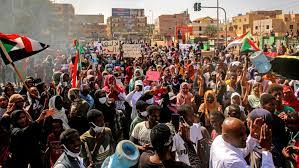Sudanese security forces dispersed tens of thousands of protesters with tear gas, rubber bullets, and sound bombs on Tuesday. The march was to mark the first anniversary of a military coup and demand that Sudan have full civilian rule.
The Sudanese Doctors’ Committee claims that security forces killed at least one person by running them over with a large truck. Anti-coup protests have led more than 100 victims to their deaths, the Doctors’ Committee says.
“Our goal today is to bring about a civilian democratic government. We want a civilian government that will help the Sudanese people. It is the power of the street …—that is going to establish the power of the people,” said Yassin al-Khalifa, 33, a man wearing a yellow cape and driving a motorcycle.”
Before the march commenced, the coup authorities cut off internet access to the entire country- but that didn’t dissuade people from taking to the streets and protesting. Protesters waved Sudanese flags, as well as pictures of young people killed by security forces.
Outside of the capital, Khartoum, protests occurred in other states, including Port Sudan and South Kordofan.
The mass protests also showed a popular rejection of the ongoing US-led talks that aim to broker a new civilian-military partnership between a coalition of political parties known as the Forces for Freedom and Change (FFC) and military coup leaders.
Many people chanted “No negotiations, no dialogue, no partnership!” during Tuesday’s demonstrations. This can be seen as a popular demand for a fully civilian government in control without the military or armed groups involved.
In an effort to put pressure on the military council, which was later renamed the Transitional Military Council (TMC), the Friends of Sudan- a coalition of countries that includes the European Union (EU), the UK and the US- released a statement that reaffirmed their support for a civilian-led government. They also argued that this government would help solve Sudan’s economic crisis, which is worsening as food prices continue to rise.
The country’s pro-democracy movement is wary of the phrase “civilian-led” because they are afraid that it means that they will work with military figures in order to control the population. They see the term as a euphemism for their old government which was overthrown last year – the same government that this new civilian-led government wants to reform.
Shahinaz Osman, a 40-year-old mother of five says, “We don’t want any negotiations with the military. We want the army to go back to their barracks and we want all armed groups to be subsumed into the military so that there is a single army.”
Another protest, this time targeting the alleged amnesty for coup leaders Abdel Fattah al-Burhan and Mohamad Hamdan Dagalo – better known as Hemeti -, is being staged outside Egypt’s embassy in London.
On June 3, 2019, security forces stormed a sit-in in Khartoum, killing 120 protesters. This was the most violent moment since President al-Bashir was toppled from power in April of the same year.
“The people in the streets want accountability. Burhan and Hemeti killed so many people and not just since October 25 but since the dispersal of the sit-in [on June 3, 2019],” said Shahinaz Gamal, a member of one of the resistance committees, who is spearheading the pro-democracy movement in Egypt’s neighbourhoods.
Rights groups have stressed the need to end impunity for the coup authorities.
In the last year, Sudan’s military leaders have been allowed to continue taking repressive measures and crackdowns as they please. HRW researcher Mohamad Osman said: “There is no accountability for these people.”
The protestors deserve a future where their rights are respected. The world should stand behind these demands and make clear that impunity for the ongoing crimes will not be tolerated.
Security forces are continuing to repress peaceful demonstrators and have not been held accountable for past abuses. Witnesses noticed an increase in people carrying light arms who were chasing protesters and trying to drive them into smaller side streets on Tuesday.
One common complaint among protesters is their belief that there are plain-clothed security officers in the crowd, stirring up suspicions and creating conflict.
“Dania Atabani, a 22 year old protester, told Al Jazeera that in the past plain cloth officers would usually just observe neighborhoods, but today they were involved in the violence,” she said.
Protestors are protesting, and the police are there to keep them from getting out of hand. Some protestors have been posing a threat to security officers, but the police have released a statement about it.
The country’s Minister of Justice went on the say that police should be given “exceptional powers” to deal with what he calls “organized rebel groups” and “sleeper cells,” those who are part of the protests, and send them to the courts for summary trials.
After the coup, various branches of the security forces made similar claims that some protesters are violent.



















